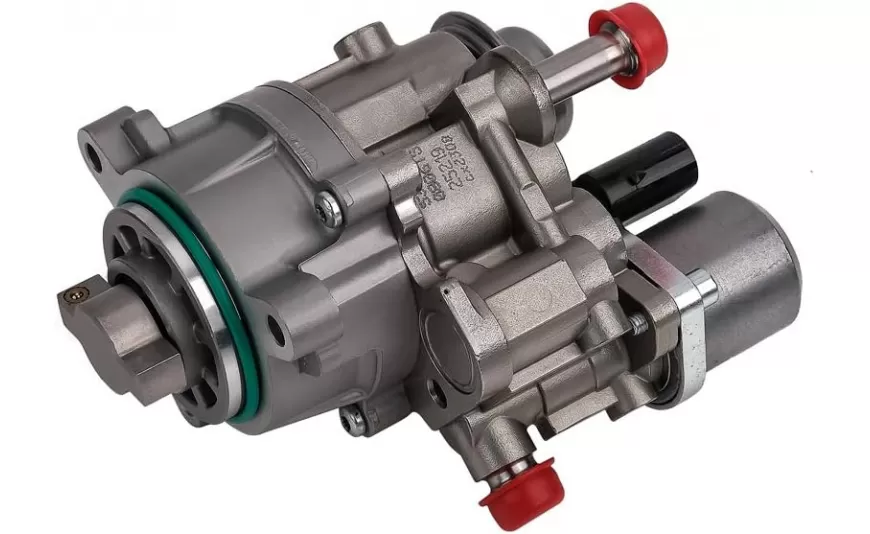
The BMW community is familiar with the BMW N54 engine. The N54 can also deliver potent strikes when things are going smoothly. Even though the BMW N54 is one of the most adaptable and powerful turbocharged engines produced by BMW, it is not without its share of issues. Failure of the BMW N54 high-pressure fuel pump is one of the most frequent problems.
The high-pressure gasoline pump is a crucial part of the fueling system for the N54, so having this issue is not ideal. If a broken N54 high-pressure fuel pump requires repair immediately, it could permanently damage the engine. This issue can frequently result in additional drivability problems, such as a rough idle, a lack of power, misfires, and hesitancy at high revs.
Since the release of the engine, BMW N54's high-pressure fuel pump failure has become a hot topic. BMW issued a service action to repair the factory pump to address the problem over the years after the N54's debut in 2006 for the first time. Unfortunately, several of the high-pressure replacement gasoline pumps also had problems.
This article will discuss the N54 high-pressure fuel pump failure issue and faulty codes.
What is an N54 High-Pressure Fuel Pump?
The high-pressure fuel pump is one of the most crucial components of the N54's fueling system. The BMW N54 has two separate fuel pumps: a high-pressure fuel pump (HPFP) and a low-pressure fuel pump (LPFP). The high-pressure fuel pump sits on the driver's side of the engine, beneath the intake manifold.
The BMW N54 is a direct-injected engine, meaning that the injectors spray gasoline directly into the combustion area, necessitating a high fuel pressure level before it can reach the injectors. The high-pressure fuel pump's function is to extract fuel from the fuel tank, pressurize it, and feed it to the injectors. This is a crucial responsibility because no power will reach the cylinders if the high-powered fuel pump breaks down.
In BMW, it runs at extremely high pressures to obtain the greatest fuel breakdown as it enters the cylinders. Before the fuel reaches the injectors, it is pressurized to a pressure of about 2,200 psi. Additionally, the N54 HPFP features a pressure regulator that keeps the fuel pressure in the system constant, ensuring that the engine continuously receives the appropriate amount of gasoline.
Failure Signs for the BMW N54 High-Pressure Fuel Pump
A few common symptoms usually exist before a BMW N54's high-pressure fuel pump totally malfunctions. It starts with a non-functioning pump, which means your automobile will have drivability issues that you might or might not notice immediately.
Other typical symptoms, however, will be fault code-related and only become apparent when you connect an OBD code reader or tuner made specifically for BMWs to your BMW. Nevertheless, the following are some of the most typical signs of N54 high-pressure fuel pump failure:
• Engine Misfires
• Hesitation Under Throttle
• Problems Starting
• Rough Idle
• Power Loss or Reduced Performance
• ½ Check Engine Light and Limp Mode
• Injector/Fuel Pump/Misfire engine codes
Ultimately, the list of possible N54 HPFP failure symptoms is quite long. Even more challenging is that many of these symptoms relate to less serious issues like broken coils, injectors, or spark plugs.
Most of the N54 HPFP failure symptoms involve an unreliable engine, whether at idle or during hard acceleration. This is because pressurized fuel must be delivered to the injectors at high pressures and volumes for effective combustion. This is the job of the high-pressure fuel pump.
Starting issues, misfires, hesitant acceleration, a rough idle, and a general loss of power result from inadequate fuel delivery to the injectors or insufficient fuel pressure when it does.
Common Fault Codes In N54 HPFP
If there is a problem with your N54's high-pressure fuel pump, in addition to the physical symptoms we mentioned above, a few typical BMW trouble codes regularly appear.
While a cheap or rental generic OBDII code reader can provide some primary diagnostic data, you'll learn more helpful information using a code reader or tuner designed specifically for BMWs, such as a JB4 or MHD.
You can data log using tuners to understand better how your N54 high-pressure fuel pump operates. Nevertheless, the following are a few of the most typical N54 HPFP fault codes:
• 2FBF (12223) – It measures the pressure of fuel when the injection is released
• 2FBE (12222) – It gives the reading of fuel pressure After Motor Stop
• 29DC (10716) – It focuses on the pump performance when cylinder injection is switched off
• 29E2 (10722) – It deals with pressure sensor signal and fuel injection rail
• 29F2 – High-pressure Fuel System
Combining any of the codes above with the misfire codes
It's crucial to remember that these codes are only likely to display if your N54 HPFP is failing and that failures might occasionally occur even when none of these codes are present. So, if your pump is failing, there is a good chance you will observe at least a few.
It's probably only a matter of time before the HPFP fails if you're suffering limp mode, long cranks, and code 2FBF. This also applies to codes 29F2 and 2FBF, denoting low fuel pressure at two critical locations in the N54 fuel system.
The Bottom Line
The high-pressure fuel pump (HPFP) failure that plagues the BMW N54 engine is a recurrent problem despite the engine's popularity in the BMW community for its efficiency and adaptability. The fueling system of the N54 is crucial, and if the HPFP continues to fail, the engine could sustain catastrophic damage.
Rough idle, losing power, misfires, and hesitation are frequent signs of HPFP failure. Even the replacement pumps, which BMW had given as service activities to replace the defective original pumps, were flawed. However, any car with an N54 engine or an early N55 engine is susceptible to HPFP failure. The most impacted models include numerous BMWs with N54 engines.
Several factors may be at play, even if the exact cause of the N54 HPFP failure is unknown. Internal pressure loss resulted from a split design defect in the original OEM fuel pump design. Although BMW provided replacements, issues remained. Utilizing poor quality or polluted fuel and performing irregular vehicle maintenance are two other causes that may cause HPFP failure.
Pump replacement, which can be pricey, is the only remedy for HPFP failure. While it is possible to replace the pump alone, it does take knowledge and experience because it involves removing several components. HPFP replacement typically costs between $1,000 and $1,500, materials and labor included.












Write a comment